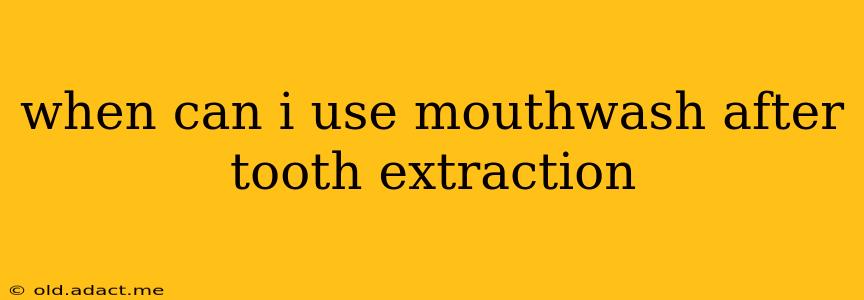Having a tooth extracted can be a bit unsettling, and you'll likely be focused on proper aftercare to ensure a smooth recovery. One common question many patients have is: when can I use mouthwash after a tooth extraction? The answer isn't a simple yes or no, and it depends on several factors. Let's delve into the details to understand when and how to use mouthwash safely after this procedure.
Understanding the Healing Process
After a tooth extraction, your mouth needs time to heal. The extraction site forms a blood clot, which is crucial for preventing infection and promoting healing. Disturbing this clot can lead to complications like dry socket, a painful condition where the clot is dislodged. This is why it's essential to follow your dentist's post-operative instructions carefully.
When to Avoid Mouthwash
Generally, you should avoid using mouthwash for at least 24-72 hours after your tooth extraction. This waiting period allows the blood clot to form properly and securely. Rinsing your mouth vigorously during this time can dislodge the clot, increasing your risk of dry socket and prolonging the healing process.
Types of Mouthwash to Avoid
Not all mouthwashes are created equal. Some contain alcohol, which can irritate the extraction site and slow down healing. Avoid alcohol-based mouthwashes completely during your initial recovery period. Even alcohol-free mouthwashes can be too harsh immediately following the procedure.
When Can I Start Using Mouthwash?
Once the initial 24-72 hour period has passed, and your dentist has given you the go-ahead, you can gently begin using a mild, alcohol-free mouthwash. Look for mouthwashes that contain chlorhexidine or other antiseptic agents to help prevent infection.
How to Use Mouthwash After Extraction
Even when using mouthwash is safe, it's crucial to do so gently:
- Dilute the mouthwash: Mix the mouthwash with an equal amount of water to reduce its potency and minimize irritation.
- Gentle rinsing: Swish the diluted mouthwash gently around your mouth, avoiding the extraction site directly. Don't swish vigorously.
- Spit gently: Spit the mouthwash out gently instead of forcefully rinsing.
- Follow up with clean water: Rinse your mouth with clean water after using the mouthwash.
Frequently Asked Questions (FAQ)
Here are some common questions about using mouthwash after tooth extraction:
Can I use mouthwash to stop bleeding after tooth extraction?
No. If you're experiencing significant bleeding after a tooth extraction, apply gentle pressure to the area with a gauze pad. Contact your dentist or oral surgeon immediately if the bleeding is excessive or doesn't stop. Mouthwash is not a substitute for appropriate post-operative care.
What if I accidentally use mouthwash too early?
If you accidentally use mouthwash too early, monitor the extraction site carefully for signs of dry socket, such as increased pain, a bad odor, or a visible empty socket. Contact your dentist immediately if you suspect dry socket.
What kind of mouthwash is best after tooth extraction?
After the initial healing period, a mild, alcohol-free mouthwash with an antiseptic agent like chlorhexidine is generally recommended. Always consult your dentist for specific recommendations.
How often should I use mouthwash after tooth extraction?
Once you're cleared to use mouthwash, your dentist may recommend rinsing 1-2 times a day. Always follow your dentist's instructions.
Is salt water rinse better than mouthwash after tooth extraction?
A warm saltwater rinse can be beneficial in the initial days following extraction to help clean the area and promote healing. However, this is not a substitute for proper mouthwash usage once you are cleared to use it by your dentist.
Remember, this information is for general knowledge and shouldn't replace professional medical advice. Always follow your dentist's specific instructions regarding post-operative care after a tooth extraction. They can assess your individual needs and provide the best guidance for your recovery.
